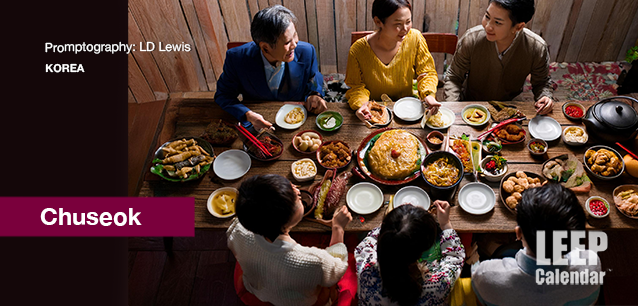 AD
AD
Today is: November 05
Scroll to explore events active on this date.
LEEP INK FEATURES

August? Absolutely!
In August, we live through the Dog Days of Summer. It's hot and often humid, and those who can leave for better climates do. Down south, winter is in full force. August is also known as "the ...

In The Heat of July: July 2025 Events
Is it hot enough (or cold enough if you're below the equator) for you yet? There is actually a day for that! Like every month, I pick a diverse collection of events you may or may not know about. This ...

May Blooms: Events in May 2025
Along with October, May is one of the most densely packed months of the year. It's before the summer humidity and the last whole month of the school year. The weather is warming in t...
About Chuseok, the Korean Thanksgiving
Food , China Japan & Korea
Ends: Oct 07, 2025
DESCRIPTION:
A FESTIVAL OF HARVEST, GRATITUDE AND TRADITION:
KOREA'S CHUSEOK
Chuseok, one of South Korea's most significant holidays, is a harvest festival celebrated to give thanks for the year's bounty. It is often called "Korean Thanksgiving" and occurs on the 15th day of the eighth month of the lunar calendar, usually in September or October. The history of Chuseok dates back over 1,000 years to the Silla Kingdom, where it was initially a celebration of the autumn harvest and a time for families to honor their ancestors.
The holiday is deeply rooted in Korean culture, symbolizing gratitude for nature's blessings and the hard work of farmers. Families gather from across the country, traveling to their hometowns to pay respects to their ancestors through rituals such as charye (ancestor memorial services), where food offerings adorn ancestral graves. This expression of reverence reinforces the importance of family ties and ancestral heritage in Korean society.
Chuseok embraces various customs, including preparing traditional foods like songpyeon (rice cakes filled with ingredients like sesame seeds or red beans) and jeon (savory pancakes). Festivities include folk games such as ssireum (Korean wrestling) and traditional dances like ganggangsullae, a circle dance performed under the full moon. People of all ages across the country, regardless of religion, observe the holiday as a time for familial bonding and cultural reflection.
The importance of Chuseok to Korean culture lies in its emphasis on family, community and the acknowledgment of the agricultural cycle that sustains life. It is a time when modern Korean society pauses to reconnect with its roots, celebrate the harvest, and honor the traditions passed down through generations.
VIDEOS
Currently, this event does not have supporting videos.
SUPPORTING DOCUMENTS
Currently, this event does not have supporting documents.
ADDITIONAL IMAGES
Currently, this event does not have supporting images.
Where would you like to go now?
 AD
AD


/footer-logo.svg)
